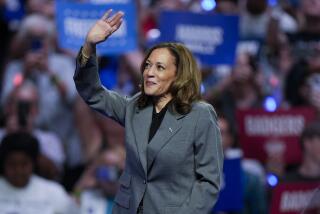Nation’s Muslim Leaders Convene
- Share via
SAN JOSE — Muslim American leaders affirmed their support Saturday for U.S. efforts to topple terrorism, but called for a more even-handed approach to foreign affairs and expressed concern over potential civil rights abuses in the hunt for suspects.
In the first meeting of a national Islamic group since the Sept. 11 terrorist attacks, leaders of the American Muslim Alliance said the U.S. needs to address poverty, illiteracy and other root problems in Islamic nations that have spawned terrorists.
While mostly avoiding any mention of America’s historic support for Israel, alliance leaders said the U.S. has too often failed to put Islamic nations on an equal footing.
“Let’s have a foreign policy that’s fair, that doesn’t favor one side over another,” said Shabbir H. Safdar, a St. Louis cancer doctor and the alliance’s vice chairman. Without such an approach, “another Osama bin Laden will come.”
About 400 people--many of them dressed in traditional Islamic garb--gathered under heavy police protection at a hotel ballroom in the heart of the Silicon Valley for the alliance’s annual conference.
During panel discussions and speeches, several participants expressed a common hope that the nation’s 7 million Muslims can bridge any gulfs with the Judeo-Christian majority while emerging as prominent political players in America.
Despite the tragic events of Sept. 11 and resulting backlash against Arab Americans, “I believe this is our moment,” said Omar Ahmed, chairman of the Council on American-Islamic Relations. “This is not the time to be shallow, to hide. This is the time to be visible and strong.”
With poll data suggesting two of every three Americans are unfamiliar with the basic tenets of Islam, Ahmed urged Muslims to establish a collegial dialogue “neighbor to neighbor, co-worker to co-worker, mosque to church.”
Much of the daylong conference was devoted to plotting a political course for America’s Islamic community. Some Muslim leaders took credit after the 2000 presidential race for helping push President Bush to victory by delivering a solid bloc of votes.
Muslims in America “are a swing vote that future candidates will avoid at their peril,” said Delinda Henley, editor of the Washington Report on Middle East Affairs.
Bush won the Islamic community’s endorsement after promising accessibility and fairness on a couple of key Muslim issues.
Islamic leaders say their political support has translated into several meetings with the president, including two since Sept. 11. Another meeting is planned, they said, with U.S. Atty. Gen. John Ashcroft on Tuesday.
Several delegates to the conference urged more Muslim Americans to run for elective office, ranging from local posts to Congress. They also talked about the need to expend political capital.
“Votes, volunteers and cash--if you can give those three, you begin to have influence,” said Sulayman S. Nyang, a Howard University professor. “That is the key in American politics.”
Agha Saeed, the alliance’s national chairman and a UC Berkeley political science professor, said he is confident the United States will rebuild Afghanistan, although such an effort is “12 years too late.”
He said the U.S. failed to provide adequate assistance to the war-torn country after the defeat of the Soviet Union in the late 1980s. “What we left behind was a failed state,” Saeed said, adding that “an Osama bin Laden arises where there is poverty” and other social ills.
On the home front, Saeed said he fears that new anti-terrorism laws passed by Congress threaten the civil liberties of Muslims who could be unfairly targeted in the sweeping investigation.
More to Read
Sign up for Essential California
The most important California stories and recommendations in your inbox every morning.
You may occasionally receive promotional content from the Los Angeles Times.













